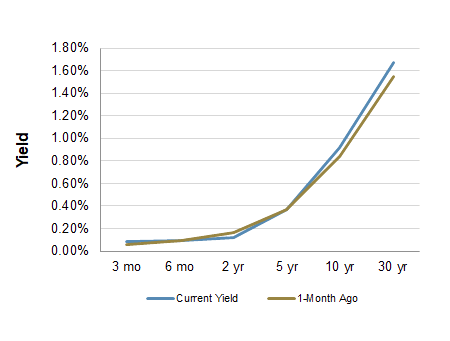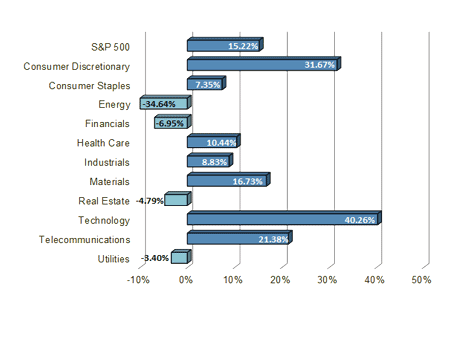December 18, 2020
Chief Economist Scott Brown discusses the latest market data.
It was an important week for economic data, although financial market participants were more focused on the prospects for a fiscal support package.
As expected, the Federal Open Market Committee (FOMC) left short-term interest rates unchanged. The FOMC indicated that it would maintain its $120 billion monthly pace of asset purchases “until substantial further progress has been made toward the Committee’s maximum employment and price stability goals.” The revised dot plot showed that 13 of 18 senior Fed officials expect short-term interest rates to remain low through 2023 (vs. 13 of 17 in September). Officials saw less downside risk to the growth outlook than in September, although Chair Powell expressed concerns about the unemployed and small businesses into early 2021.
Retail sales fell 1.1% in November (+4.1% y/y), down 0.9% ex-autos (+3.6% y/y), reflecting the pandemic’s impact on holiday shopping. Sales at department stores fell 7.7% (+14.7% before adjustment, vs. +28.2% in November 2019). Sales at non-store retailers (includes internet and mail order) edged up 0.2%, but rose 29.2% from a year earlier, compared to +8.8% in the 12 months ending November 2019. Industrial production rose 0.4% in November (-5.5%), with factory output up 0.8% (-3.5% y/y). Single-family permits rose 1.3% in November, up 22.2% from a year ago.
Next week, the third estimate of 3Q20 GDP growth is expected to be little changed from the second estimate (+33.1%). November personal spending and durable goods shipments data will shed some light on 4Q20 GDP. None of that may matter for the financial markets, as the focus is on the future, especially the arrival of vaccines and the fiscal support package.
Indices
| Last | Last Week | YTD return % | |
|---|---|---|---|
| DJIA | 30303.37 | 29999.26 | 6.18% |
| NASDAQ | 12764.75 | 12405.81 | 42.26% |
| S&P 500 | 3722.48 | 3668.10 | 15.22% |
| MSCI EAFE | 2141.25 | 2100.00 | 5.12% |
| Russell 2000 | 1978.05 | 1922.70 | 18.55% |
Consumer Money Rates
| Last | 1 year ago | |
|---|---|---|
| Prime Rate | 3.25 | 4.75 |
| Fed Funds | 0.08 | 1.54 |
| 30-year mortgage | 2.79 | 3.83 |
Currencies
| Last | 1 year ago | |
|---|---|---|
| Dollars per British Pound | 1.3585 | 1.308 |
| Dollars per Euro | 1.2268 | 1.111 |
| Japanese Yen per Dollar | 103.11 | 109.55 |
| Canadian Dollars per Dollar | 1.272 | 1.312 |
| Mexican Peso per Dollar | 19.816 | 18.965 |
Commodities
| Last | 1 year ago | |
|---|---|---|
| Crude Oil | 48.36 | 60.93 |
| Gold | 1890.40 | 1478.70 |
Bond Rates
| Last | 1 month ago | |
|---|---|---|
| 2-year treasury | 0.12 | 0.16 |
| 10-year treasury | 0.92 | 0.84 |
| 10-year municipal (TEY) | 1.06 | 1.12 |
Commodities
| Last | 1 year ago | |
|---|---|---|
| Crude Oil | 46.78 | 58.76 |
| Gold | 1837.40 | 1475.00 |
Bond Rates
| Last | 1 month ago | |
|---|---|---|
| 2-year treasury | 0.13 | 0.18 |
| 10-year treasury | 0.89 | 0.88 |
| 10-year municipal (TEY) | 1.08 | 1.31 |
Treasury Yield Curve – 12/18/2020

As of close of business 12/17/2020
S&P Sector Performance (YTD) – 12/18/2020

Economic Calendar
| December 18 | — | Real GDP (3Q20, 3rd estimate) |
| — | Existing Home Sales (November) | |
| — | CB Consumer Confidence (December) | |
| December 23 | — | Jobless Claims (week ending December 19) |
| — | Personal Income and Spending (November) | |
| — | Durable Goods Orders (November) | |
| — | New Home Sales (November) | |
| — | UM Consumer Sentiment (December) | |
| December 25 | — | Christmas (markets closed) |
| January 1 | — | New Year’s Day (markets closed) |
| January 5 | — | Georgia Runoff Elections |
| January 8 | — | Employment Report (December) |
All expressions of opinion reflect the judgment of the Research Department of Raymond James & Associates, Inc. and are subject to change. There is no assurance any of the forecasts mentioned will occur or that any trends mentioned will continue in the future. Investing involves risks including the possible loss of capital. Past performance is not a guarantee of future results. International investing is subject to additional risks such as currency fluctuations, different financial accounting standards by country, and possible political and economic risks, which may be greater in emerging markets. While interest on municipal bonds is generally exempt from federal income tax, it may be subject to the federal alternative minimum tax, and state or local taxes. In addition, certain municipal bonds (such as Build America Bonds) are issued without a federal tax exemption, which subjects the related interest income to federal income tax. Municipal bonds may be subject to capital gains taxes if sold or redeemed at a profit. Taxable Equivalent Yield (TEY) assumes a 35% tax rate.
The Dow Jones Industrial Average is an unmanaged index of 30 widely held stocks. The NASDAQ Composite Index is an unmanaged index of all common stocks listed on the NASDAQ National Stock Market. The S&P 500 is an unmanaged index of 500 widely held stocks. The MSCI EAFE (Europe, Australia, Far East) index is an unmanaged index that is generally considered representative of the international stock market. The Russell 2000 index is an unmanaged index of small cap securities which generally involve greater risks. An investment cannot be made directly in these indexes. The performance noted does not include fees or charges, which would reduce an investor’s returns. U.S. government bonds and treasury bills are guaranteed by the US government and, if held to maturity, offer a fixed rate of return and guaranteed principal value. U.S. government bonds are issued and guaranteed as to the timely payment of principal and interest by the federal government. Treasury bills are certificates reflecting short-term (less than one year) obligations of the U.S. government.
Commodities trading is generally considered speculative because of the significant potential for investment loss. Markets for commodities are likely to be volatile and there may be sharp price fluctuations even during periods when prices overall are rising. Specific sector investing can be subject to different and greater risks than more diversified investments. Gross Domestic Product (GDP) is the annual total market value of all final goods and services produced domestically by the U.S. The federal funds rate (“Fed Funds”) is the interest rate at which banks and credit unions lend reserve balances to other depository institutions overnight. The prime rate is the underlying index for most credit cards, home equity loans and lines of credit, auto loans, and personal loans. Material prepared by Raymond James for use by financial advisors. Data source: Bloomberg, as of close of business December 17, 2020.
Markets & Investing Members of the Raymond James Investment Strategy Committee share their views on...
Markets & Investing Review the latest Weekly Headings by CIO Larry Adam. Key Takeaways ...
Technology & Innovation Learn about a few simple things you can do to protect your personal information...